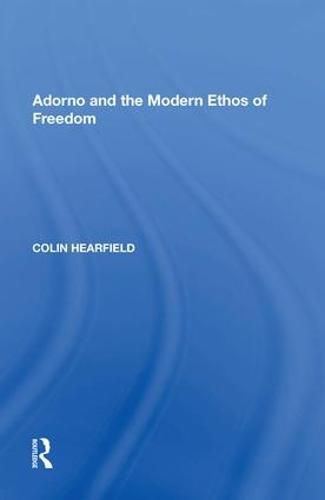Readings Newsletter
Become a Readings Member to make your shopping experience even easier.
Sign in or sign up for free!
You’re not far away from qualifying for FREE standard shipping within Australia
You’ve qualified for FREE standard shipping within Australia
The cart is loading…






Delivering a concise and lucid account of Adorno’s response to the modern question of freedom, Hearfield sets into critical relief six other modern philosophies of freedom from Kant, Hegel, Nietzsche, Heidegger, Foucault and Habermas. The book presents a broad variety of perspectives concerning the question of freedom, and draws out the contrasting and superior merit of Adorno’s response. Hearfield employs an interpretive framework that makes a distinction between a conceptual ratio (Kant, Hegel and Habermas) and an existential poiesis (Nietzsche, Heidegger and Foucault). The book includes singular reconstructions of Adorno’s immanent critiques of Kant, Hegel, Nietzsche and Heidegger, and demonstrates the theoretical instabilities peculiar to Foucault and Habermas. The book concludes by revealing the respective ‘blind spots’ in the conceptual ratio and existential poiesis modes of thinking, which block our capacity for becoming free.
$9.00 standard shipping within Australia
FREE standard shipping within Australia for orders over $100.00
Express & International shipping calculated at checkout
Delivering a concise and lucid account of Adorno’s response to the modern question of freedom, Hearfield sets into critical relief six other modern philosophies of freedom from Kant, Hegel, Nietzsche, Heidegger, Foucault and Habermas. The book presents a broad variety of perspectives concerning the question of freedom, and draws out the contrasting and superior merit of Adorno’s response. Hearfield employs an interpretive framework that makes a distinction between a conceptual ratio (Kant, Hegel and Habermas) and an existential poiesis (Nietzsche, Heidegger and Foucault). The book includes singular reconstructions of Adorno’s immanent critiques of Kant, Hegel, Nietzsche and Heidegger, and demonstrates the theoretical instabilities peculiar to Foucault and Habermas. The book concludes by revealing the respective ‘blind spots’ in the conceptual ratio and existential poiesis modes of thinking, which block our capacity for becoming free.